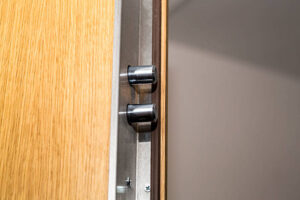Smart Locks vs. Traditional High-Security Locks: A No-Nonsense Comparison
Ever wondered if smart locks can hold a candle to traditional high security door locks? Let’s dive into the nitty-gritty and see what each has to offer.
First off, smart locks are like that cool new gadget everyone’s talking about. They come with all sorts of bells and whistles—remote access, voice commands, even integration with your home automation system. Imagine sitting on your couch and locking your front door just by saying, “Hey Google.” Sounds futuristic, right?
But here’s the kicker: while these features are snazzy, they also open up Pandora’s box of potential vulnerabilities. Cybersecurity is no joke; hackers love nothing more than cracking codes for sport or worse. If someone gains unauthorized access to your Wi-Fi network or exploits a software flaw in the lock itself, you might as well have left the key under the doormat.
Traditional high-security locks don’t mess around with any of this digital mumbo jumbo. They’re built like tanks—solid metal construction designed to withstand brute force attacks and sophisticated picking techniques alike. These bad boys rely on physical keys that can’t be hacked from halfway across the globe.
However, let’s not put old-school locks on too high a pedestal either. Lost keys are an absolute nightmare! You lose one tiny piece of metal and suddenly you’re locked out—or worse yet—someone else could find it and waltz right into your home.

Then there’s maintenance—a point often overlooked but crucial nonetheless. Smart locks need regular updates just like any other tech device you own (think smartphones). Miss an update? Boom! You’re vulnerable again until it’s patched up by manufacturers who may take their sweet time rolling out fixes.
On the flip side, traditional high-security locks are practically maintenance-free. Sure, you might need to oil them once in a blue moon or replace a worn-out key, but that’s about it. They’re like the trusty old pickup truck of door security—reliable and low-maintenance.
Now let’s talk convenience. Smart locks win this round hands down. Ever tried fumbling for your keys with an armful of groceries? With smart locks, just use your phone or even voice commands to unlock the door effortlessly. Some models even have fingerprint scanners—no more lost keys!
But here’s where things get sticky: battery life. Most smart locks run on batteries which means if they die—and trust me, they will—you could be locked out until you replace them. Imagine coming home after a long day only to find your lock’s gone kaput because you forgot to change its batteries.
Traditional high-security locks don’t suffer from such issues; as long as you’ve got your key (and haven’t misplaced it), you’re golden.
Let’s not forget cost either! High-quality smart locks can set you back quite a bit compared to their mechanical counterparts which tend to be cheaper upfront though may require professional installation adding some extra bucks there too.
So what should one choose? If cutting-edge tech and ultimate convenience tickle your fancy—and you’re willing to stay on top of updates and battery changes—a smart lock might be right up your alley! But if peace-of-mind knowing no hacker can mess with your front door appeals more—or perhaps dealing with fewer gadgets sounds heavenly—the stalwart traditional high-security lock is hard-to-beat classic choice!
Are Traditional Locks Still Relevant in a Digital Age?
In today’s fast-paced digital era, the debate between smart locks and traditional high security door locks is more relevant than ever. It’s like comparing apples to oranges—both have their merits, but which one truly fits your needs?
Let’s kick things off with smart locks. These nifty gadgets offer convenience at your fingertips (literally). Imagine walking up to your front door and having it unlock automatically because it recognizes your smartphone. No more fumbling for keys in the dark or juggling groceries while trying to find that elusive keyhole.
But here’s where it gets interesting: smart locks are not without their quirks. They rely heavily on technology, which means they can be vulnerable to hacking or software glitches. Remember that time when all those Wi-Fi routers went haywire due to a firmware update? Now imagine if that happened with your lock system! Suddenly, you’re locked out of your own home—or worse, someone else has access.
Traditional high-security locks don’t face these issues. They’re built like tanks—solid and reliable. You might think they’re old-fashioned, but there’s something reassuring about hearing that satisfying click as you turn the key in a well-made lock cylinder.
Now let’s talk durability and maintenance costs. Smart locks often require regular updates and battery replacements—a bit like keeping up with the latest smartphone model every year or so. On top of this, installation can sometimes be tricky; you’ll probably need professional help unless you’re handy with tools.
Contrast this with traditional high-security options—they’re low-maintenance champions! Once installed correctly by a skilled locksmith (who doesn’t love supporting local tradespeople?), these babies will last for years without needing much attention beyond occasional lubrication.
Security-wise too there’s an ongoing tug-of-war between both camps: tech-savvy criminals may find ways around electronic systems faster than physical ones—but then again advanced mechanical designs present formidable challenges even seasoned burglars struggle against!
Ever heard horror stories about power outages rendering homes inaccessible due reliance upon electricity-dependent devices alone? Well guess what—you won’t experience such nightmares sticking trusty old-school mechanisms instead!
Sure, smart locks can send alerts to your phone if someone tries to tamper with them. That’s a neat trick! But what happens when your Wi-Fi goes down or you forget to charge the batteries? You’re left standing outside like a wet cat in the rain.
On the flip side, traditional high-security locks have stood the test of time for good reason. They’re like that dependable friend who’s always got your back—no frills, just solid reliability. And let’s not forget: these locks don’t need an app update or worry about being compatible with your latest smartphone model.
Imagine this scenario: You come home after a long day and find out there’s been an internet outage in your area. With a smart lock, you’re potentially stuck until service is restored. With a traditional lock? Just turn the key and step inside.






